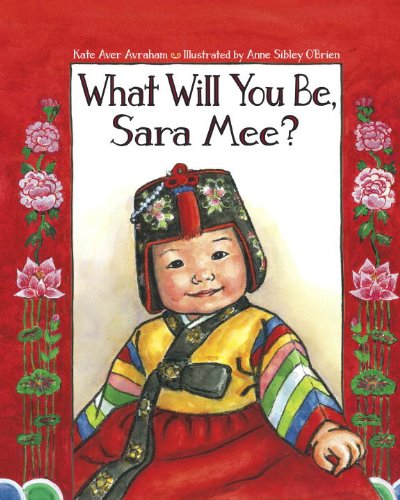09 Feb / What Will You Be, Sara Mee? by Kate Aver Avraham, illustrated by Anne Sibley O’Brien

 The story could not be any sweeter. A big brother greets his little sister on the morning of her first birthday, and lovingly explains the happy events of the special day ahead.
The story could not be any sweeter. A big brother greets his little sister on the morning of her first birthday, and lovingly explains the happy events of the special day ahead.
Following Korean tradition, the first birthday is an especially auspicious day, filled with loving extended family, surrounded by well-wishing friends, eating lots of fabulous treats … and deciding your future through a centuries-old prophecy game. The birthday child chooses a single object from a selection of symbolic objects, which can vary from family to family. In Sara Mee’s family, she’s presented with a toy bow-and-arrow set, a paintbrush, little bag of gold coins, a book, a spoon, some yarn, and an ink bottle … which means, depending on her innocent choice, she could become a soldier, artist, successful in business, scholar, cook, live a long life, or become a writer.
You’ll have to read for yourself to see what Sara Mee chooses, of course … I can’t give that secret away …
As delightful as the picture book is (and certainly I’ll be sending copies out as gifts, especially to my Korean American friends with new kids), the one thing that mars the happy title is a problematic Romanization of Korean words. Avraham seems to use the outdated McCune-Reischauer system which turns the word dol (first birthday) erroneously into tol (and so on with other Korean words) throughout the book.
For a native Korean speaker, such mispronunciation proves jarring. The revised Romanization system for Korean (which is at least a decade old in wide usage) is far more accurate, developed by the National Academy of the Korean Language and officially released by Korea’s Ministry of Culture and Tourism – in other words, created by native-speaking Koreans as opposed to two non-Korean, non-native-speaking Americans back in the 1930s, no disrespect intended towards the erudite pair.
Avraham, an adoptive mother of a Korean daughter, gives “special thanks to Dr. Byung-Joon Lim, Professor and Chairman of the Korean language department at the Defense Language Institute in Monterey, California, for reading the manuscript and making corrections to the Korean.” So Avraham can’t be faulted for seeking out a local expert … but it’s strange that a Korean language professor in the 21st century chooses to use an outdated, phonetically inaccurate system.
Readers: Children
Published: 2010
